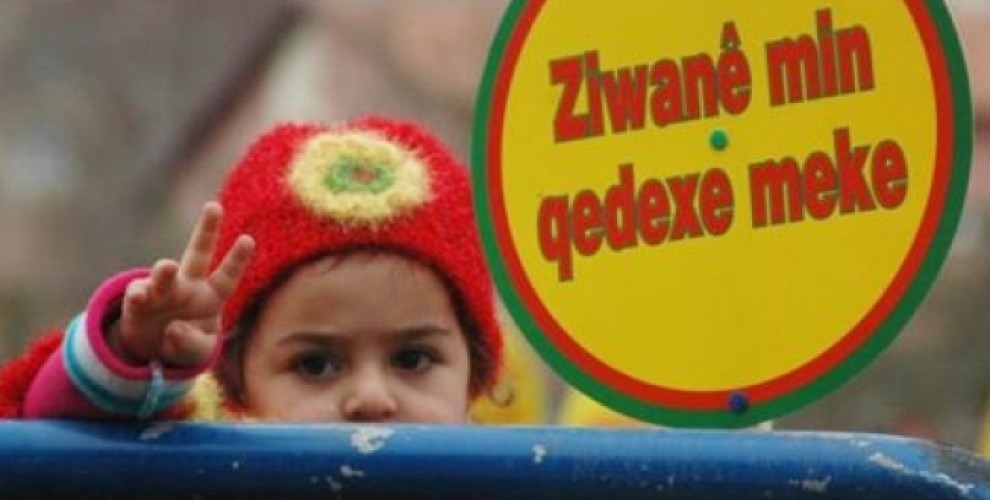The Rojava Revolution favours new education system
Children in Rojava and Northern Syria are educated in their mother tongue.
Children in Rojava and Northern Syria are educated in their mother tongue.

Among the achievements reached by Kurds in Rojava since the 19 July 2012 revolution, certainly is the establishment of a new education system.
This new curriculum and system based first and foremost on the right to be educated in one’s mother tongue, is one of the great achievements the Turkish state wants to destroy, and one the Baath regime in Syria had suppressed till 2012.
Before the Rojava Revolution begun, the Baath regime had indeed imposed a de facto ban not just on the Kurdish language but in fact on any element of Kurdishness.
The Rojava Revolution and the Kurdish Language Renaissance
The Rojava Revolution changed all this and for the first time Kurds had the opportunity not just to self-govern themselves but also to prepare and test new education system as well as economic, cultural, social.
In reality Kurdish language studies began to be carried out in an academic way before the Rojava Revolution. The Democratic Society Movement Kurdish Language Institution, had carried out, against all odds, its first congress in Kobanê in 2007 and the second congress in Aleppo in 2009. The third congress was held in Amude in 2012. And it was in this congress that the broad working lines for the new curriculum and education system were drawn.
Based on the right to be educated in one’s own mother tongue, schools in the 3 Rojava Cantons begun to teach in Kurdish. First of all hundreds of teachers were trained so to provide the best education to students.
Then there was the lack of education material which had to be addressed and together with the new curriculum, new material was prepared.
As the other pillar of the Rojava Revolution is the co-existence of nations, and therefore of cultures and languages, the new education system designed by the new Autonomous Canton Administrations took into account the presence of different nations in their territory, and so a curriculum was defined ensuring the teaching in one vehicular language plus the teaching of at least two other languages.
So, children who until the Rojava revolution had been educated solely in Arabic, now had actually the opportunity to be taught in their mother language while learning the other languages spoken in their areas.
Academies were opened in Rojava: the first being the Martyr Ferzat Kemanger Academy [dedicated to a Kurdish teacher hanged in Iran on 9 May 2010] which was inaugurated on 11 August 2013.
Afrin Kurdish Language Institution, with the cooperation of the Rojava Teachers Association, opened the Academy Martyr Viyan Amara on 28 October and begun to train teachers.
Education in mother tongue from primary school
The Kurdish Language Institution also opened the Celadet Bedirxan Academy in Qamishlo on 24 October 2013. Immediately afterwards, the Martyr Viyan Amara Academy opened in Kobanê. At the beginning of 2015, many academies based on democratic confederalism were up and running in all three cantons.
The Democratic Autonomy declaration in the cantons confirmed the importance attached to education, especially Kurdish education. A new system was developed by the member experts in the Education Council for the development of democratic nation-based scientific education in schools. The system, supported also by the Kurdish Language Institution soon was running in all Rojava.
The 2015-2016 academic year in the Cizre Canton enjoyed special educational materials prepared in such a way that the Kurds, Arabs and Syrians living in the region could learn their mother tongue.
For the first time students were able to study in their mother tongue academically and systematically.
Education is prepared in the languages spoken in the Canton. Each child studied until year 3 in his/her own mother tongue. In year 4, every child learns the other languages spoken in the Canton. In year 5, they also learn a foreign language.
In the academic year 2016-2017, training materials were prepared in the mother tongue for all grades of schooling.
The joint study carried out by the Kurdish Language Institute and Cizre District Education Council has produced new educational materials to be used in the primary and secondary school education system. With these materials, Arabs and Assyrians, as well as Kurdish, began to study in their mother tongue.
In the cantons of Afrin and Kobanê, Kurdish education materials were prepared for primary and middle schools.
University Education
Academic education also begun, and the Kurdish language studies career opened at Afrin university.
Afrin Democratic Autonomous Administration opened the first university of Rojava Autonomous Region in Afrin on 14 June 2015.
Beside the Afrin University, the Cizire Canton Democratic Autonomous Administration opened Rojava University on 4 July 2016. Kobanê University was opened on 30 September 2017.
The universities in Rojava-Northern Syria Federation are giving classes in both Kurdish and Arabic.
The activities of the Kurdish Language Institution are organised not only in Rojava but also in the other areas of northern Syria which have been liberated by the Syrian Democratic Forces (SDF).
The reality of the Democratic Autonomy is that the peoples living in Rojava and Northern Syria are able, for the first time ever, to study and being educated in their own mother tongue.
The Baath regime had tried to send languages and cultures into oblivion. But the will of the people of Rojava have reverted this situation.
Now Turkey is trying to destroy this important achievement. Not by coincidence they have bombed and occupied Afrin. What Afrin represented, a successful model of co-existence of different nations with a healthy and progressive education system, is not acceptable to Turkey.
But the people of Rojava and Northern Syria have no intentions to give up their achievements.